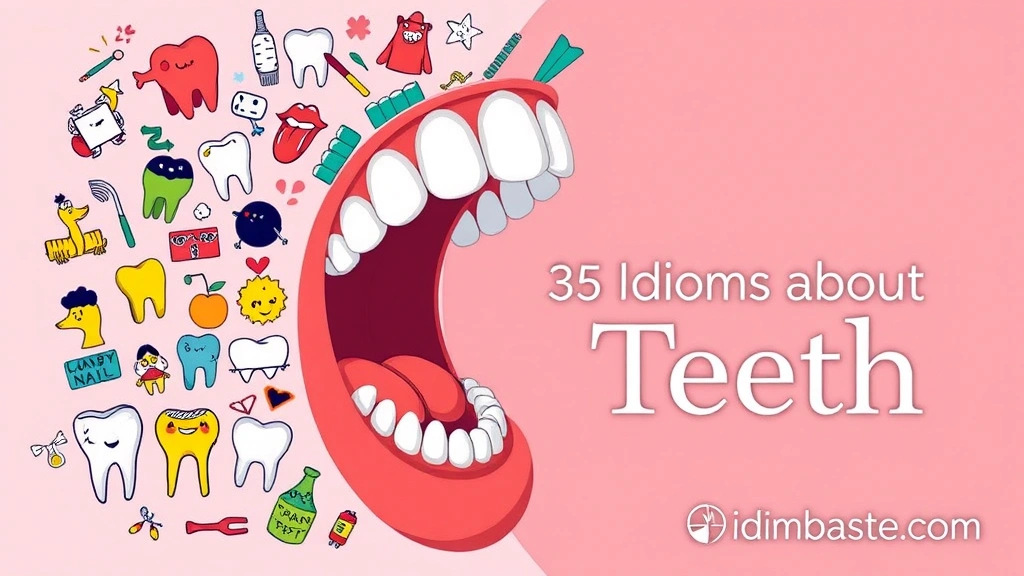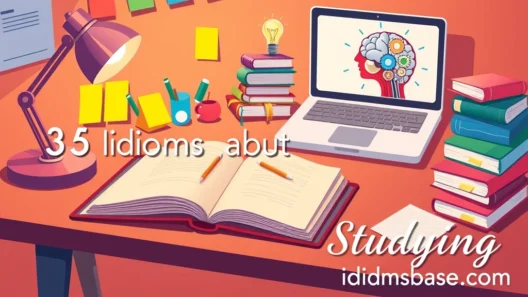Hello there, language lovers and curious minds! Have you ever noticed how many fascinating expressions we use every day, often without even thinking about their original meaning? It's truly amazing how language evolves, isn't it? Today, we're going on a delightful adventure into the world of idioms, and guess what's taking center stage? Your teeth! Yes, those pearly whites (or not-so-pearly, no judgment here!) are surprisingly central to a whole host of colorful phrases that add spice and character to our conversations.
You might be thinking, "Teeth? Really? How many idioms could there possibly be about teeth?" Well, prepare to be surprised and charmed! From showing courage to facing harsh realities, teeth pop up in the most unexpected and vivid ways in the English language. So, get ready to sink your teeth into this fun list, because we're about to explore 35 idioms about teeth that will make you smile, perhaps even literally!
A Glimpse into the World of Tooth-Related Idioms
Why are teeth such a popular subject for idioms, you ask? Think about it: teeth are fundamental to eating, speaking, and even our appearance. They're strong, sharp, and can symbolize everything from power to pain. This makes them perfect metaphors for a wide range of human experiences and emotions. Let's dig in!
The Power of the Bite: Idioms of Control and Effort
These idioms often relate to exerting effort, taking control, or facing difficulties head-on. They really showcase the strength and determination associated with our dental friends!
-
To sink your teeth into something: Oh, this is one of my favorites! It means to get thoroughly involved in something, to tackle it with enthusiasm and determination. Like when you get a new, exciting project at work, and you just can't wait to sink your teeth into it! You're ready to give it your full attention and energy.
-
To bite off more than you can chew: We've all been there, haven't we? This means to take on a task that is too big or difficult for you to handle. Imagine trying to eat a sandwich that's just too enormous for one bite – that's the feeling! It's a gentle reminder to be realistic about your capabilities.
-
To grit your teeth: This idiom conjures up a vivid image, doesn't it? It means to show determination and courage in the face of pain or difficulty. When things get tough, and you just have to push through, you grit your teeth and keep going. It’s about perseverance.
-
To set your teeth on edge: Ever heard a really unpleasant sound, like nails on a chalkboard? That feeling of intense irritation or discomfort is what this idiom describes. Something sets your teeth on edge when it makes you feel deeply annoyed or uneasy.
-
To cut your teeth on something: This one is adorable! It means to gain your first experience in a particular area or activity. Just like babies cut their teeth when they start getting their first teeth, you cut your teeth on a basic task before moving on to more complex ones.
-
To bite the bullet: This powerful idiom means to face a difficult or unpleasant situation with courage and endurance. It often implies accepting something undesirable because it's unavoidable. When you bite the bullet, you're saying, "Okay, this is tough, but I'm going to deal with it."
-
To get your teeth into something: Very similar to "sink your teeth into something," this means to become deeply involved and engaged with a task or subject. It suggests a desire to understand it thoroughly and work on it effectively.
-
To show your teeth: This idiom is a bit more aggressive. It means to show aggression or a willingness to fight or challenge someone. Like a dog snarling, it's about revealing your readiness to defend yourself or attack.
-
To be long in the tooth: This is a polite (and sometimes humorous) way of saying someone is old. It comes from horses, whose gums recede as they age, making their teeth appear longer. So, if someone is long in the tooth, they've seen a few years!
-
To fight tooth and nail: This means to fight with great intensity and determination, using every effort possible. When you fight tooth and nail for something, you're giving it your absolute all, refusing to give up.
The Grin and Bear It: Idioms of Appearance and Expression
These idioms often revolve around how we present ourselves, our emotions, or how we react to situations, often involving a smile or a lack thereof.
-
To be long in the tooth: (Yes, it's so good, it deserves a second mention for emphasis on appearance!) It's a gentle, often humorous way to describe someone as being old. You might say, "My old car is getting a bit long in the tooth!"
-
To grin and bear it: This means to accept a difficult or unpleasant situation without complaint, even if you are unhappy about it. You might not like what's happening, but you grin and bear it because you have no other choice.
-
To have a sweet tooth: Oh, who doesn't relate to this one? If you have a sweet tooth, you have a strong liking or craving for sweet foods. Chocolate, cake, ice cream – bring it on!
-
To be armed to the teeth: This idiom means to be heavily armed with weapons. But it can also be used metaphorically to mean being extremely well-prepared or having all the necessary resources for a task.

-
To give your eye teeth for something: This expresses a strong desire for something, indicating you would give up something very valuable to obtain it. Your "eye teeth" (canine teeth) are prominent and valuable, so giving them up signifies a huge sacrifice.
-
To have teeth (something has teeth): When a law, rule, or agreement has teeth, it means it has real power and effectiveness; it can be enforced. Without teeth, it's just a suggestion!
-
To be all teeth and smiles: This describes someone who is overly or insincerely friendly, often with a forced or superficial cheerfulness. It suggests a lack of genuine warmth.
-
To get your teeth into a problem: This is about focusing intently on a problem to solve it, similar to "sink your teeth into." It implies a determined effort to analyze and resolve an issue.
-
To pull teeth: This refers to something that is extremely difficult or tedious to do or get someone to do. If getting information from someone is like pulling teeth, it means they are very reluctant to share it.
-
To gnash your teeth: This means to grind your teeth together, usually in anger, frustration, or despair. It's a visual expression of intense negative emotion.
The Sharp Edge: Idioms of Difficulty and Reality
These idioms often convey a sense of harshness, reality, or confronting unpleasant truths.
-
To bite the hand that feeds you: This is a classic! It means to harm or turn against someone who has helped you or provided for you. It's considered a betrayal.
-
To bite the dust: This idiom means to fall to the ground, often implying defeat, failure, or death. A plan might bite the dust if it fails completely.
-
To get long in the tooth: (Yes, it’s a triple threat! It’s useful for appearance, age, and sometimes even the idea of something being past its prime.) It means to be old, as mentioned before, but can also apply to things that are outdated or showing their age.
-
To have a tooth for a tooth: This is a play on "an eye for an eye, a tooth for a tooth," referring to the principle of retaliatory justice, where punishment should match the crime.

-
To be long in the tooth for something: This implies that someone is too old or too experienced for a particular role or activity, suggesting it's time for them to move on.
-
To put teeth into something: Similar to "to have teeth," this means to make something more effective or powerful, usually a rule or law, by adding a mechanism for enforcement.
-
To bare your teeth: Like "show your teeth," this means to reveal aggression or hostility. It's a warning signal, indicating a readiness to attack.
-
To bite your tongue: This means to stop yourself from saying something, even if you want to, usually because it would be inappropriate or cause trouble. You literally hold your words back.
-
To get your teeth into a good book: This is a delightful one! It means to become deeply absorbed and engaged in reading a book, enjoying it thoroughly.
-
To have teeth like a shark: This is a descriptive idiom, meaning to have very sharp and numerous teeth, often used to describe someone's aggressive or predatory nature in a metaphorical sense.
-
To be long in the tooth (of a plan/idea): Again, versatile! This can mean that a plan or idea is outdated or no longer effective due to its age.
-
To be at someone's throat (or teeth): This expresses intense anger or conflict between people, suggesting they are on the verge of a physical fight or a very heated argument.
-
To have a tooth out: This literally means to have a tooth extracted, but can also be used metaphorically to mean enduring a difficult or painful experience.
-
To sink your teeth into a problem: This emphasizes the act of tackling a complex problem with intense focus and determination, aiming to solve it.
-
To cut your teeth on a skill: This is a more specific application of "cut your teeth on something," referring to gaining initial experience and developing foundational skills in a particular area.
Key Takeaways

So, what have we learned from our journey through these toothy idioms?
- Teeth are incredibly versatile metaphors: They symbolize strength, aggression, determination, age, experience, and even vulnerability.
- Context is king: The meaning of an idiom often depends heavily on the surrounding words and the situation.
- Language is alive: Idioms add color, humor, and depth to our communication, making English endlessly fascinating.
- Understanding idioms enriches your communication: Knowing these phrases helps you understand native speakers better and allows you to express yourself more vividly.
Frequently Asked Questions About Idioms
Q1: What exactly is an idiom?
An idiom is a phrase or expression whose meaning cannot be understood from the ordinary meaning of its individual words. It's a figurative saying that has a commonly understood meaning unique to the language. For example, "kick the bucket" doesn't literally mean to kick a bucket; it means to die.
Q2: Why are idioms so important in English?
Idioms are crucial because they are a fundamental part of everyday English conversation. Native speakers use them constantly, often without realizing it. Understanding idioms is key to comprehending spoken and written English, and using them correctly can make your English sound more natural and fluent. They add color, expressiveness, and nuance that literal language often can't.
Q3: How can I learn and remember new idioms?
Learning idioms can be fun! Here are some tips:
- Context is key: Try to understand the meaning of an idiom from the context in which you hear or read it.
- Visualize: Many idioms create vivid images. Try to picture what the idiom describes. For example, for "bite the bullet," imagine someone actually biting a metal bullet!
- Categorize: Group idioms by theme (like "teeth" in our list!) or by the emotion they express.
- Use them! The best way to remember idioms is to start incorporating them into your own conversations and writing. Don't be afraid to try!
- Keep a notebook: Jot down new idioms you encounter, along with their meanings and an example sentence.
- Read widely: The more you read English books, articles, and watch English movies/TV shows, the more idioms you'll naturally encounter.
Q4: Are idioms formal or informal?
Idioms can be both! Some idioms are very informal and best used in casual conversation with friends (e.g., "spill the beans"). Others can be used in more formal writing or speeches (e.g., "the jury is still out"). It's important to learn the context and register for each idiom. When in doubt, it's safer to stick to more common and less informal ones in professional settings.
Q5: Can I create my own idioms?
While you can certainly be creative with language, creating a new idiom that gains widespread acceptance is extremely rare. Idioms evolve organically over time within a language community. They become "idioms" because their unique, non-literal meaning is commonly understood by most native speakers. So, while you can invent a new phrase, it won't be an idiom until it's adopted and understood by a large population.
Q6: Do other languages have idioms about teeth too?
Absolutely! Every language has its own unique set of idioms, and many cultures find similar metaphors for common experiences. While the exact phrases will differ, you'll find expressions about courage, difficulty, age, and determination that might use body parts or other everyday objects as metaphors, just like English uses teeth. It's a fascinating area of linguistic comparison!
Q7: Are there any idioms that are becoming less common or outdated?
Yes, language is always evolving! Some idioms do become less common over time, especially if the original context or objects they refer to are no longer part of everyday life. For example, an idiom related to old farming practices might be understood by fewer people today. However, many classic idioms, especially those related to universal human experiences, tend to stick around for a very long time.
Ready to Flash Your Understanding?
There you have it – 35 incredible idioms all about teeth! From showing your determination to describing someone's age, these expressions truly add a unique flavor to the English language. I hope you've enjoyed sinking your teeth into this topic as much as I enjoyed writing about it!
Now that you're armed with this fantastic vocabulary, why not try incorporating a few of these idioms into your next conversation or piece of writing? You'll be amazed at how much more vivid and expressive your English can become. So go on, don't bite off more than you can chew, but certainly, don't be afraid to show your teeth (in a good way!) when it comes to using these brilliant phrases. What's your favorite tooth-related idiom? Share it in the comments below – we'd love to hear from you!






